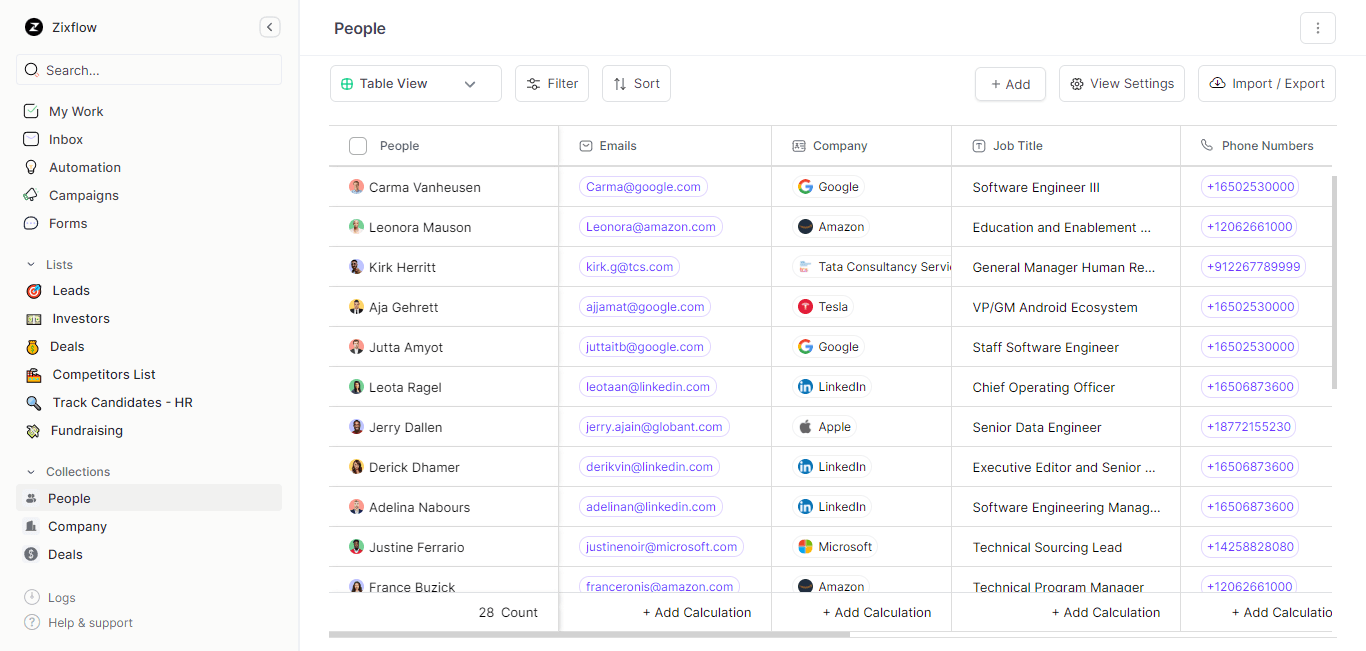Salesforce Failing Startups & SMBs: A Founder's Perspective

More than thousands of businesses use Salesforce, a cloud-based CRM and SaaS platform, to manage contacts and workflows to build trustful connections.
Being in the industry since 1999, Salesforce has become a trademark in the CRM sector. It has become a foundation for numerous other solutions and has solidified its position in the market share of 19.8% in CRM applications.
All these things sound great and make Salesforce look like the best option for new businesses. However, startups and small-sized companies have to consider various factors like usability, learning curve, and most importantly, cost before they can implement a new solution.
Before we dive deeper into understanding why Salesforce may not be a great choice for SMBs, we need to comprehend what makes Salesforce the best in the business.
Why is Salesforce a market leader?
The reason why Salesforce is head and shoulders above other platforms is due to its wide range of features and tools it offers. On top of that, it keeps on evolving those features to match the current day needs of companies.
This transformation paired with years of experience in the field, made Salesforce a giant in the CRM space. Salesforce has the capabilities to manage almost every aspect of a business.
For example, it includes lead generation features to acquire new prospects and manage them with its in-built CRM. To nurture those prospects, it allows you to reach out to them via outreach campaigns. Plus, with the automation and analytics modules, you can ensure you’re a step ahead throughout the stages of the sales pipeline.
Another factor that has helped Salesforce in its success is its scalability. You don’t have to worry about getting new tools with Salesforce as your business grows. You can integrate new apps as your needs expand and keep using the same platform as a centralized hub for management.
Salesforce limitations for startups & SMBs
Now, let’s get to the point. If you’re a new business, why might Salesforce not be a CRM for you? As I said before, there are numerous factors you have to have to consider when deciding on your tech stack.
Having said that, here are some of the reasons you must consider before getting Salesforce as a small business owner.
Pricing
Cost is the primary concern for most of the startups as they are either bootstrapped or have to function on a very tight budget. Salesforce offers straightforward pricing plans for its products but you have to pay for the year in one go. There is no option to subscribe to the platform on a monthly basis and pause your payment if you don’t feel like using it.
Moreover, the entry-level plans provide you with the basic functionality of the CRM with the outreach capability to reach out to your contacts. But if you wish to unlock advanced options, you have to pay extra. This aspect of Salesforce makes it quite a hefty investment for startups, even those that secured investors through their pitch deck.
User intuitiveness
User-friendliness is also an important factor new businesses should take into account when getting a technological solution. After all, not every startup has highly-trained team members or consultants to help them get used to a complex platform.
Salesforce is a comprehensive solution, built to serve companies of all sizes. And it can become quite difficult for an SMB to get used to its features. Don’t get me wrong, having a platform that can help you manage everything is something that I admire but too many features can sometimes make the platform more complex, needing a lot of effort to make the most of it.
This is the case with Salesforce. Unless you provide proper training to your members or have a Salesforce expert with you, startups can not use it to the fullest.
Integration complexities
Integrating apps or external tools with your CRM can greatly boost efficiency as all the required details are available in a centralized platform and you don’t have to switch between numerous tools to get things done.
Salesforce has its own marketplace for apps known as AppExchange, where small businesses can download and connect third-party applications to enhance efficiency.
However, it’s not as easy as it sounds. The apps on AppExchange are easy to install but are not always simple to integrate or set up. For instance, after installing an app on your Salesforce account, if you find yourself unable to find its settings or get it working correctly, you may need to check the list of Salesforce's known issues or devote extra efforts to reach out to Salesforce’s support to help you get it running.
In some cases, small businesses have to get middleware software to link Salesforce to the installed app to customize their platform. This not only negatively affects sales efficiency but also does not seem like an economically viable solution for new companies.
A large number of features
The primary reason why Salesforce got the place it is today is because of its huge feature set that can handle anything from managing contacts to streamlining complex, multi-step operations. Although more is generally good when it comes to technology, that may not be a good option for startups.
For new businesses, the multitude of features offered by Salesforce might become overwhelming quickly. Also, most startups do not have the resources to implement numerous business operations. So, they won’t be using the advanced capabilities that Salesforce comes with.
Another point to note here is using a platform where you are not using most of the options can get a bit bothersome and distract you from concentrating on essential activities. The “feature-richness” of the software can make it difficult for new members to understand its strengths and require additional guidance to learn to use it.
A recommendation for new businesses
As a business owner myself, I know what it takes to get a business up and running. Without proper tools, you will have to devote a lot of extra time and effort to accomplish your tasks.
Having said that, I want to suggest a CRM, marketing, and automation platform that is designed for small businesses to manage their data and simplify their sales processes.
Of course, I am slightly biased with this recommendation but if you’re looking for an all-in-one CRM solution for your startup that is simple to use and comes with advanced capabilities, then you should check out Zixflow.
Zixflow is a fully customizable workplace suite that, with its native CRM, helps you save your clients’ data and enrich it with an AI-powered engine to connect with them in a personalized way.

On top of that, with its Lifelong Free version, you don’t have to worry about calculating per-month or annual costs and cutting corners in your budget. This way, you can focus on core business operations to get your startup to new heights.
Access the next-gen platform for free. Get started with Zixflow today.
